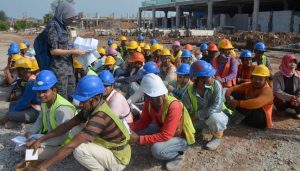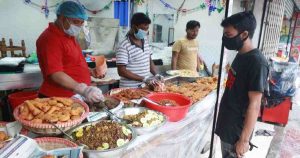DHAKA – Rising population growth and large-scale corruption are the principal barriers to the economic progress of Bangladesh, according to an American opinion poll survey.In the survey conducted by Gallup, a Washington-based surveyor, 60 percent of the Bangladeshi respondents identified population while 56 percent corruption as major obstacles to the country’s economic advancement. However, more than half of the respondents (57 percent) are happy with the government’s initiatives to fight corruption while 39 percent are dissatisfied. Six percent respondents declined to answer any questions on corruption.
Those who were most dissatisfied with the government’s efforts to combat corruption included respondents with university education or higher and living in large cities of Bangladesh, Gallup found.
Poorly qualified population, crime and lack of security are the other important factors standing in the way of the country’s development. Most respondents, however, think the economy is getting better, says the recently published “Insights South Asia – Bangladesh Survey 2012.”
Gallup conducted 1,000 face-to-face interviews on 13 broad issues in six divisions of the country in May last year.
The topics included economy, living standards, role of religion in political the system, fight against corruption, migration, security threats of South Asia, regional cooperation and obstacles to establish closer ties in the region.
Thirty-eight percent rated the economic condition as “only fair” and 37 percent as “good.” Twenty percent termed it “poor” and only 3 percent rated it “excellent,” Gallup found in its survey carried out in collaboration with South Asia Democratic Forum in Dhaka, Rajshahi, Chittagong, Khulna, Sylhet and Barisal divisions.
On a positive note, 62 percent of the respondents found an improvement in the living standard of their families over the past five years. Twenty percent, however, said that their living standard got worse, and 19 percent said it “remained the same.”
Young respondents aged 15 to 24 were found to be more optimistic about their current and past standard of living.
Fifty-nine percent of the respondents mentioned India among the South Asian countries to have the biggest impact on Bangladesh’s economy while 45 percent said that the United States among all other countries beyond South Asia had the greatest impact on their economic conditions.
A vast majority of the respondents — 85 percent — rejected violence as a means to resolve conflicts within Bangladesh. Only 9 percent favored violence as a way to resolve conflict.
Terrorism was identified as the number one threat to regional security in South Asia. Religious fundamentalism and rivalry between India and Pakistan also pose major threats to regional security. Gallup found Pakistan as the biggest threat to regional security followed by India.
(Source: The Independent)



